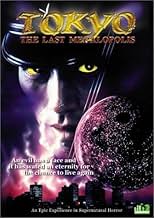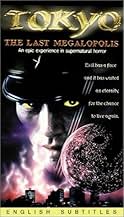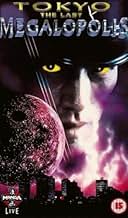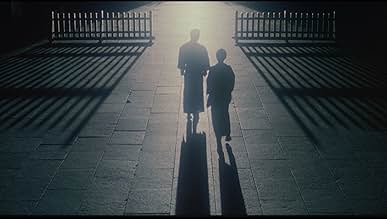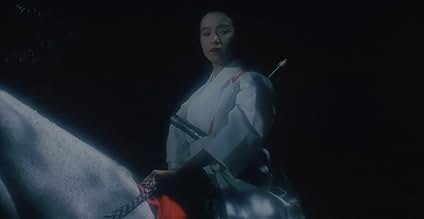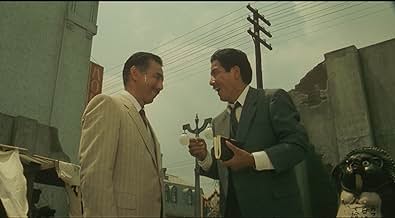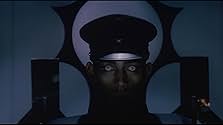Ajouter une intrigue dans votre langueA demonic reincarnation of a Japanese general from the 10th century appears in the early 20th century Tokyo with a mission to destroy the blooming city.A demonic reincarnation of a Japanese general from the 10th century appears in the early 20th century Tokyo with a mission to destroy the blooming city.A demonic reincarnation of a Japanese general from the 10th century appears in the early 20th century Tokyo with a mission to destroy the blooming city.
- Récompenses
- 2 nominations au total
Jun'ichi Ishida
- Yoichiro Tatsumiya
- (as Junichi Ishida)
Bunshi Katsura VI
- Shigemaru Kuroda
- (as Sanshi Katsura)
Tamasaburô Bandô
- Kyoka Izumi
- (as Tamasaburo Bando)
Histoire
Le saviez-vous
- AnecdotesSwiss artist H. R. Giger, best known for his work on Ridley Scott's ALIEN, contributed concept art for the film. He originally showed interest in working on set, however his schedule would not permit it.
- Citations
Eichi Shibusawa: Both destruction and growth repeat endlessly by devouring people's lives. Even so, people flock to the city. Nobody can stop them.
[subtitled version]
- ConnexionsFollowed by Teito taisen (1989)
Commentaire à la une
First of all, this review is for the live-action film, not the anime one. The anime one was made in 1991.
Before I begin, I just want to acknowledge that this is a VERY confusing movie and difficult to recommend to average English viewers. It's based on an extremely long and complicated novel released only in Japan known as "Teito Monogatari" ("Tale of the Imperial Capital") by a scholar Hiroshi Aramata. The original novel is basically a huge retelling of the history of Tokyo from the turn of the century all the way up to the next millennium, but done from an occultist viewpoint. It was notable for being a pioneer of the "fantasy occult boom" that dominated Japanese pop culture in the late 80's and early 90's and was hugely influential (see the ONMYOJI films, which were based on books written in the wake of this novel's popularity).
The novel is composed of 12 volumes each around 250--500 pages in length. But that's not all. There is an unofficial 13th volume which serves as a side story (and was also made into a movie). Is that it? No. There are also prequel, several spin-off works (such as THE GREAT YOKAI WAR, made into a film by Takaashi Miike) and "series analysis" books, and a another huge retelling in the form of "Shin Teito Monogatari" ("New Tale of the Capital"). So yeah...this series has its roots in Japanese literature far more than it does in films.
The movie is very ambitious in that it attempts to adapt the first four books of the series (1000 pages covering 20 years of history) to the screen in only a 2.5 hour time span! So if the story feels like it's moving along too fast; it's because there's WAY too much ground to cover. For example the characters that populate the story will not have much identity unless you know their historical origins (many of them are based on real famous people who lived during that time period) and their roles in the original novel.
The main problem is the film is that it wants to be a profoundly entertaining blockbuster, but doesn't know how to properly balance the exposition and entertainment value. From the moody overblown intro sequence with its stirring Wagner-esque orchestral score to the explosive pyrotechnics filled finale, it's clear the movie was looking to cash in on big budget Hollywood SPFX extravaganzas like ALIENS and POLTERGEIST. But the source material it's adapting is extremely dense and simply unfit for such a production. The world the story is creating is too big, and the film simply does not give enough time or background introducing the audience into it. The only way this movie can be really enjoyed is as a supplement to the original novel, but since that has never been translated, English speakers are kind of screwed. And despite the budget, the SPFX also really need some refinement too; even for the time, some of the effects were terribly primitive. Thus, I cannot lie, but to many people the movie simply will NOT be a satisfying experience.
But I love it.
For one thing, it's a unique film. Many of the guys responsible for this flick also were responsible for other classic J-horror and Japanese SPFX flicks, but here they're dealing with something quite different. Although advertised as a horror flick by ADV's misleading promotional material, I should point out it's really a genre-bender of a movie: a horror, fantasy, science fiction, and historical fiction film all at once. Thus you get a few scares, a lot of whimsical fantasy, and even some education to boot.
Second of all, it's a visually absorbing film. A lot of money was spent on this movie, and that's no more apparent than the meticulously constructed costumes and sets (an entire 150 meter avenue was reconstructed, buildings, people, cars and all, for use in the movie). The movie just goes to great lengths to recreate Tokyo as it was during the 1920's.
I'm also quite serious about the parallels I find with this film and John Boorman's Excalibur--both are fantasy films helmed by directors with uneven track records and stylistic eccentricities (John Boorman and Akio Jissoji), both feature epic stories which take place over several years, both feature some great classical actors (Nicol Williamson, Patrick Stewart, Shintaro Katsu, Ko Nishimura, etc.) in primary and supporting roles, both films have make heavy use of classical music for key dramatic points, both feature stories which are darker modern representations of classic mythology, and both are visually sumptuous, romanticized views of the past.
The horror is borrowed from classic vampire movies such as F.W. Murnau's NOSFERATU and the Hammer films. There is also some influence from more modern supernatural thrillers such as EXORCIST. Kyusaku Shimada, the actor who plays the main villain, became famous overnight due to his performance here. Imagine Christopher Lee's "Dracula" with a monstrous chin and bodily movements reminiscent of Max Schreck and you will get something akin to his portrayal of the villain in this movie.
And apparently I wasn't alone. The movie itself was a box office hit in Japan when in it was released. Some magazines even went so far as to call it the "best Japanese science fiction production of all time" (wow...) Many contemporary stars of Japanese cinema got their start here and owe a lot to this movie.
But that doesn't translate into immediate recommendation over here. For various reasons (especially the lack of the source material's availability), the film is quite difficult to recommend to Westerners and I would not pressure anyone to watch it.
On the other hand, if you want something different...an uneven historical fantasy epic that challenges you with an overabundance of modern Japanese history and classic Japanese (and Chinese) folklore references, then by all means give this film a try. :)
Before I begin, I just want to acknowledge that this is a VERY confusing movie and difficult to recommend to average English viewers. It's based on an extremely long and complicated novel released only in Japan known as "Teito Monogatari" ("Tale of the Imperial Capital") by a scholar Hiroshi Aramata. The original novel is basically a huge retelling of the history of Tokyo from the turn of the century all the way up to the next millennium, but done from an occultist viewpoint. It was notable for being a pioneer of the "fantasy occult boom" that dominated Japanese pop culture in the late 80's and early 90's and was hugely influential (see the ONMYOJI films, which were based on books written in the wake of this novel's popularity).
The novel is composed of 12 volumes each around 250--500 pages in length. But that's not all. There is an unofficial 13th volume which serves as a side story (and was also made into a movie). Is that it? No. There are also prequel, several spin-off works (such as THE GREAT YOKAI WAR, made into a film by Takaashi Miike) and "series analysis" books, and a another huge retelling in the form of "Shin Teito Monogatari" ("New Tale of the Capital"). So yeah...this series has its roots in Japanese literature far more than it does in films.
The movie is very ambitious in that it attempts to adapt the first four books of the series (1000 pages covering 20 years of history) to the screen in only a 2.5 hour time span! So if the story feels like it's moving along too fast; it's because there's WAY too much ground to cover. For example the characters that populate the story will not have much identity unless you know their historical origins (many of them are based on real famous people who lived during that time period) and their roles in the original novel.
The main problem is the film is that it wants to be a profoundly entertaining blockbuster, but doesn't know how to properly balance the exposition and entertainment value. From the moody overblown intro sequence with its stirring Wagner-esque orchestral score to the explosive pyrotechnics filled finale, it's clear the movie was looking to cash in on big budget Hollywood SPFX extravaganzas like ALIENS and POLTERGEIST. But the source material it's adapting is extremely dense and simply unfit for such a production. The world the story is creating is too big, and the film simply does not give enough time or background introducing the audience into it. The only way this movie can be really enjoyed is as a supplement to the original novel, but since that has never been translated, English speakers are kind of screwed. And despite the budget, the SPFX also really need some refinement too; even for the time, some of the effects were terribly primitive. Thus, I cannot lie, but to many people the movie simply will NOT be a satisfying experience.
But I love it.
For one thing, it's a unique film. Many of the guys responsible for this flick also were responsible for other classic J-horror and Japanese SPFX flicks, but here they're dealing with something quite different. Although advertised as a horror flick by ADV's misleading promotional material, I should point out it's really a genre-bender of a movie: a horror, fantasy, science fiction, and historical fiction film all at once. Thus you get a few scares, a lot of whimsical fantasy, and even some education to boot.
Second of all, it's a visually absorbing film. A lot of money was spent on this movie, and that's no more apparent than the meticulously constructed costumes and sets (an entire 150 meter avenue was reconstructed, buildings, people, cars and all, for use in the movie). The movie just goes to great lengths to recreate Tokyo as it was during the 1920's.
I'm also quite serious about the parallels I find with this film and John Boorman's Excalibur--both are fantasy films helmed by directors with uneven track records and stylistic eccentricities (John Boorman and Akio Jissoji), both feature epic stories which take place over several years, both feature some great classical actors (Nicol Williamson, Patrick Stewart, Shintaro Katsu, Ko Nishimura, etc.) in primary and supporting roles, both films have make heavy use of classical music for key dramatic points, both feature stories which are darker modern representations of classic mythology, and both are visually sumptuous, romanticized views of the past.
The horror is borrowed from classic vampire movies such as F.W. Murnau's NOSFERATU and the Hammer films. There is also some influence from more modern supernatural thrillers such as EXORCIST. Kyusaku Shimada, the actor who plays the main villain, became famous overnight due to his performance here. Imagine Christopher Lee's "Dracula" with a monstrous chin and bodily movements reminiscent of Max Schreck and you will get something akin to his portrayal of the villain in this movie.
And apparently I wasn't alone. The movie itself was a box office hit in Japan when in it was released. Some magazines even went so far as to call it the "best Japanese science fiction production of all time" (wow...) Many contemporary stars of Japanese cinema got their start here and owe a lot to this movie.
But that doesn't translate into immediate recommendation over here. For various reasons (especially the lack of the source material's availability), the film is quite difficult to recommend to Westerners and I would not pressure anyone to watch it.
On the other hand, if you want something different...an uneven historical fantasy epic that challenges you with an overabundance of modern Japanese history and classic Japanese (and Chinese) folklore references, then by all means give this film a try. :)
- bobgray2000
- 15 nov. 2009
- Permalien
Meilleurs choix
Connectez-vous pour évaluer et suivre la liste de favoris afin de recevoir des recommandations personnalisées
- How long is Tokyo: The Last Megalopolis?Alimenté par Alexa
Détails
- Date de sortie
- Pays d’origine
- Site officiel
- Langue
- Aussi connu sous le nom de
- Tokyo: The Last Megalopolis
- Société de production
- Voir plus de crédits d'entreprise sur IMDbPro
- Durée2 heures 15 minutes
- Couleur
Contribuer à cette page
Suggérer une modification ou ajouter du contenu manquant

Lacune principale
By what name was Teito monogatari (1988) officially released in India in English?
Répondre

